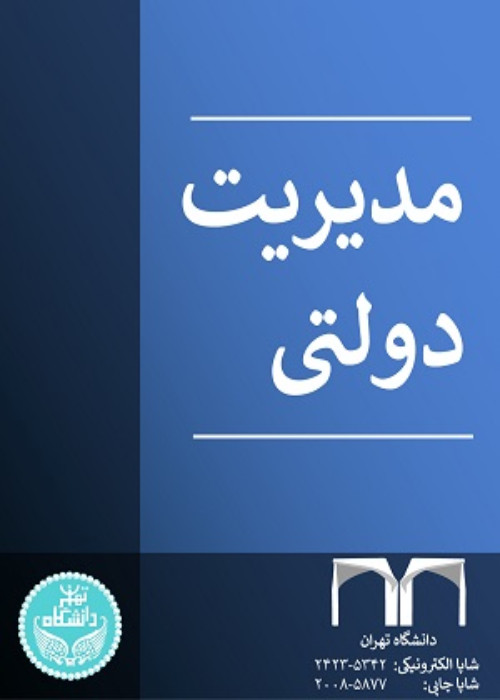Organizational Silence and Positive Leadership Strategies: The Mediating Role of Psychological Empowerment
Author(s):
Article Type:
Research/Original Article (دارای رتبه معتبر)
Abstract:
Objective
Organizational silence is a prevalent occurrence within companies, which can lead to serious adverse outcomes. Consequently, managers and researchers studying organizational behavior recognize it as a noteworthy challenge faced by organizations. The primary goal of this study was to predict and clarify the phenomenon of organizational silence by implementing positive leadership strategies and investigating the potential mediating effect of psychological empowerment.Methods
For practical and managerial purposes, this study employed a combination of developmental instruments and phenomenology based on lived experiences in order to identify the sub-constructs of organizational silence. Additionally, a descriptive correlational design was utilized to investigate the relationship between variables. The statistical population consisted of all staff and faculty members at Farhangian University in the 9th district of Eastern Iran. Qualitative data were collected through semi-structured interviews with 26 participants selected up to theoretical saturation. Data were then categorized through theme analysis in four dimensions (context, causal, process, and intervention) and 10 components, including socio-communication, economic, organizational, political, cultural, informational, regulatory, managerial, human, and human resources. A 65-question questionnaire was developed based on these themes. In the quantitative part of the study, 180 people were selected using stratified random sampling according to Cochran's formula. The Kaiser, Meyer, and Olkin (KMO) index was used to investigate the adequacy of the sample, and the index for all data was over 0.6, indicating the adequacy of the sample data for factor analysis. The study utilized Cameron's Positive Leadership Questionnaire (2008), Spritzer and Mishra's Psychological Empowerment Questionnaire (1997), and a researcher-made Organizational Silence Questionnaire. The reliability of the instruments in terms of Cronbach's alpha was 0.94, 0.77, and 0.93, respectively. The convergent validity of the questionnaires was 0.86, 0.50, and 0.62, respectively. The data were analyzed using SPSS 24 and Smart PLS software.Results
The study investigated the model from two criteria, R2 and Q2 values, and the overall model of structural equations was evaluated using the "goodness of fit" criterion. The goodness of fit value was 0.324, and considering the three values of 0.01, 0.25, and 0.36, the appropriate fit of the overall research model was confirmed. The results showed a negative and significant relationship between positive leadership strategies (positive communication, positive human relationships, positive significance, and positive atmosphere) and psychological empowerment (meaningfulness, competence, self-determination, effectiveness, and trust) with organizational silence. Additionally, psychological empowerment plays a mediating role between positive leadership and organizational silence.Conclusion
The study concludes that utilizing positive leadership styles and employee empowerment can effectively reduce employees' silence. Therefore, it is recommended that administrators at Farhangian University establish an environment that fosters employee growth and well-being. Managers can facilitate empowerment among their employees by taking into account their psychological needs, fostering trust and involvement, and delegating authority to grant independence and self-determination. Additionally, managers can provide positive and constructive feedback, establish positive relationships, and create a positive atmosphere to create a safe and comfortable environment for employees to comment more easily. At the organizational level, employees should have access to professional development programs. In general, dedicating resources to the enhancement and cultivation of positive leadership and employee empowerment can enhance the growth and efficiency of the organization through increased employee engagement and collaboration.Language:
Persian
Published:
Quarterly Journal Public Administration, Volume:15 Issue: 53, 2023
Pages:
67 to 93
magiran.com/p2567536
دانلود و مطالعه متن این مقاله با یکی از روشهای زیر امکان پذیر است:
اشتراک شخصی
با عضویت و پرداخت آنلاین حق اشتراک یکساله به مبلغ 1,390,000ريال میتوانید 70 عنوان مطلب دانلود کنید!
اشتراک سازمانی
به کتابخانه دانشگاه یا محل کار خود پیشنهاد کنید تا اشتراک سازمانی این پایگاه را برای دسترسی نامحدود همه کاربران به متن مطالب تهیه نمایند!
توجه!
- حق عضویت دریافتی صرف حمایت از نشریات عضو و نگهداری، تکمیل و توسعه مگیران میشود.
- پرداخت حق اشتراک و دانلود مقالات اجازه بازنشر آن در سایر رسانههای چاپی و دیجیتال را به کاربر نمیدهد.
In order to view content subscription is required
Personal subscription
Subscribe magiran.com for 70 € euros via PayPal and download 70 articles during a year.
Organization subscription
Please contact us to subscribe your university or library for unlimited access!



